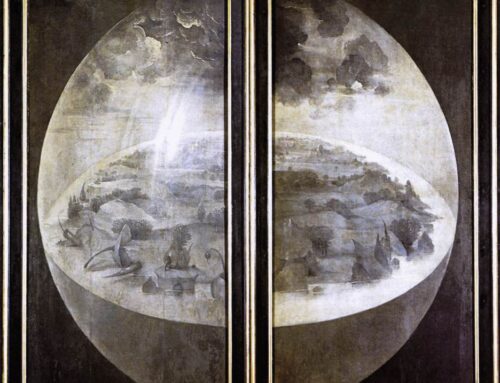Science and the music of history: is this a new age of knowledge? A scientist and an historian discuss the value of the past, and the promise of the future.
Scientist: Hey there, Scrupulus, what have you been up to this morning?
Historian: Oh hello, Speculus. Just listening to music.
Scientist: I like to do that, too, in the lab. It’s calming, and helps me concentrate.
Historian: That’s appropriate.
Scientist: What do you mean?
Historian: That you find inspiration in music.
Scientist: How so?
Historian: Well, music comes from the muses, the goddesses of inspiration.
Scientist: Is there a Muse of Science? Or of History?
Historian: Clio is the Muse of History, so they say. As for science, the muses help with scientia – knowledge – writ large. Historians are generally indebted to the muses, since Memory is the mother of them all.
Scientist: This is a charming myth. It’s a good story, like other myths, and completely unscientific!
Historian: But that doesn’t make it any less true.
Scientist: You’re starting to surprise me. I would think historians would hardly associate myths with truth, and in fact spend their efforts at undermining myths.
Historian: Certain myths, yes, when they disguise the truth, or simplify it. But not all myths. In fact, it’s hard to deny their historical influence or importance.
Scientist: Oh I see: you relate influence with truth! I would have expected you to lead others to enlightenment, away from these superstitions.
Historian: As if out of Plato’s cave, into the sunlight?
Scientist: Why, yes.
Historian: That metaphor is another myth!
Scientist: Now you’re just being clever. You’re only making me more convinced about the power of science and scientific inquiry.
Historian: What do you mean?
Scientist: If we pause only for a moment’s reflection, we realize that science is the only avenue to truth. Certainly as an historian you must recognize that, before our scientific advancements, much of humanity was lost in a sea of superstition and foolishness. Now we can see that science is the technology show us the path forward. That’s why Phil Knight, Priscilla Chen, and Mark Zuckerberg are donating millions and billions to scientific research, to cure all disease and better the human condition. As President Obama has remarked, scientific progress is the key to our future. And Stephen Hawking, a scientist without parallel, said recently that history is largely the history of stupidity, which is why science directs us to the future of intelligence: computing and artificial intelligence can enhance our biology.
Historian: I would offer alternative theories.
Scientist: Of course you would: which ones? For you humanities scholars are fond of theories that escape empirical reasoning, and while quick to criticize us for our ignorance, know less about scientific principles than the most introductory student.
Historian: I do not disagree with your charge. But in the spirit of the muses, I would suggest that literary progress – progress in understanding and creating literature – is the key to our future; and that the scientific future imagined by Hawking and others is the one of rational arrogance, while studying history shows us continued examples of compassion as well as cruelty, of humility as well as foolish pretension. In fact, I would say that I’m glad I’ve actually won you over to my way of thinking.
Scientist: What are you talking about?
Historian: You’ve become an historian!
Scientist: Take a step back, man. You really are confused. I’m no more an historian than you are a scientist.
Historian: Let me say it’s refreshing that you pursue the old-fashioned notions of the Marquis de Condorcet and others, who argued for the concept of reason’s progress emancipating humanity from ignorance and error. And by talking about the future of intelligence, you scientists – along with other leaders of society – are making a similar historical statement. It must be comforting and self-affirming to feel yourself on the “cutting edge,” with all that darkness behind you. I would think that even a brief look at twentieth-century experiences with science, from the tank to the atom bomb, would chasten such optimism in technology’s answer to human problems.
Scientist: What is your answer, then?
Historian: I study the past, and do not prognosticate about the future. But I think that history teaches us, with all its observations of dynamic change, the irreducibility of human experience. Humanity presents the same qualities – its anxieties over loss, its innate drives, its mortality, its search for significance in the face of dim destiny – if in different shapes and guises. Humanity’s depths lie beneath any single historical instance, even as we journey across different seas and with and against different currents. The voyage is shared, as is the quest for harbor.
Scientist: Now you’re sounding mythical again, my good Odysseus! Do not be deceived by the song of the sirens!
Historian: That music has its charms, to be sure, for scientists as well as historians. Even sweeter for Odysseus in his homecoming was the music of Demodocus in Phaeacia, who sang of his past and his fallen comrades at Troy. This song made Odysseus reveal his identity to his hosts, and set off on his final crossing and reunion with his family on Ithaca.
Scientist; I sense a lesson in here.
Historian: There are many lessons, I think. Not least is the encounter with our history in unexpected ways and unforeseen moments. We must have ears to hear it. It transforms our sense of place and of ourselves.
Scientist: My lab looks the same, whether I play Mozart or Adele.
Historian: So back to the lab, then. But remember the historical warning of Chargaff: “Our time, when even Old Testament prophets must disguise themselves in laboratory gowns, will not understand when I say that the majority of those things that concern or should concern humanity plays out in realms in which the natural sciences have no bearing at all.”1
1. Unbegreifliches Geheimnis: Wissenschaft für und gegen die Natur








Leave A Comment